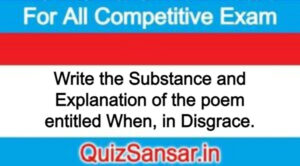
Write the Substance and Explanation of the poem entitled When, in Disgrace.
Write the Substance and Explanation of the poem entitled When, in Disgrace.
Ans.
Substance of the Poem
The poet feels highly dejected and disappointed when he finds that social prestige is in trouble and financially he is completely broken in financial state. He finds none to show sympathy and generosity for hi Wherever he goes he is badly humiliated. He is condemned everywhere. is treated as a social outcast. (I: is generally assumed that when a person in an unpleasant or unenviable situation, society also distances itself from him.) In his difficulties, the poet finds himself completely alone. He sits alone and feels sorry for himself. He cures his fate and prays to God, but his prayers go unheard. He envies what others have achieved and wishes be could be like them or have what they have. However, when in the depths of his despair, he thinks of his love for his friend (W. H.), his spirits are lifted, When he thinks of his friend, his mood is elevated to heaven and he feels rich. He thinks that he would not change places even with kings.
Explanations
(1) When, in disgrace with fortune and men’s eyes,
I all alone beweep my outcast state
And trouble deaf heaven with my bootless cries
And look upon myself and curse my fate,
Wishing me like to one more rich in hope,
Featured like him, like him with friends possess’d,
Desiring this man’s art and that man’s scope,
Reference to the Context: These lines have been extracted from the sonnet No. 29 entitled When, in Disgrace, written by William Shakespeare. Here the poet expresses his intense emotions and grief at his insecure and miserable condition. He is regarded everywhere as a social outcast.
Explanation: The poet feels that he has been completely ruined. He finds his reputation and honour in great peril. He feels that he is broken financially and he is being humiliated as a social outcast. No one cares for him. No one likes his company. In his utter loneliness, when no one, including God listens to his prayers, he curses his fate and feels highly dejected. He envies what others have achieved and wishes that he could be like them or have what they have. He never showed the feelings of jealousy and hatred for his friend. The poet is always true friend of his friend. He appreciates the attractive personality and other tempting traits of his friend. He likes his skill. He wishes to be like his friend who was endowed with rich qualities and hopes. He wishes to achieve the optimistic attitude of his friend.
Critical Comments: It is uncertain whether the state of disgrace referred to in this sonnet is a real or imaginary one.
(2) With what I most enjoy contented least;
Yet in these thoughts myself almost despising.
Haply I think on thee, and then my state,
Like to the lark at break of day arising
From sullen earth, sings hymns at heaven’s gate;
Reference to the Context : As above. The poet’s grief and his wounded feelings are consoled when he recalls his dear friend W. H. His intense love for his friend gives him secured feelings and optimistic attitude.
Explanation: Resenting his bad luck, the poet envies the successful art of others and counts the ills and misfortunes of his life. His depression derived from his being separated from the young man, even more so because he envisions the youth in the company of others while the poet is all alone. When the poet is engrossed in these thoughts, he almost considers himself to be despicable for being so cast down. Whenever he recalls the moments spent in the company of his dear friend, his mental state improves. The poet’s state becomes like the lark which rises from the gloomy earth singing hymns. The hymns sung by the lark rise up from the earth to the gate of heaven. It is the poet’s soul which has been liberated by his thinking of his dear friend. Whenever he has recalled his love in his memory, he feels happier than a king could be, and therefore have no wish to be disappointed.
Critical Comments: There is a splendid image of a morning lark that sings hymns at heaven’s gate.
- What is meant by Database Management System?
- Discuss the advantages and drawbacks of database.
- What do you mean by database ? Discuss its Characteristics.
- What is Data Mining?
- What are the conditions of communication?
- What do you mean by business communication ?
- organization / Differentiate between classical and modern theory of organization
- What is forecasting






